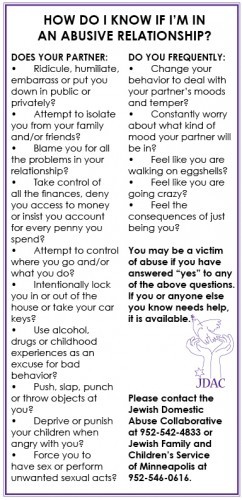 This is a guest post by Sarah Slavick at Jewish Family and Children’s Service of Minneapolis.
This is a guest post by Sarah Slavick at Jewish Family and Children’s Service of Minneapolis.
Domestic abuse. It’s not a topic people are eager to discuss. But, occasionally, there are opportunities for public dialogue about this crucial issue.
“Women’s Minyan,” a play about one woman’s struggle that is featured by the Minnesota Jewish Theatre Company through Sunday, May 9, presents an opportunity to discuss domestic abuse. The theater is also organizing post-show discussions including one on Sunday May 2nd that will include a rabbi, the Jewish Domestic Abuse Collaborative (JDAC), and a survivor of abuse.
In case you can’t attend the play, the following article includes the story of a client of Jewish Family and Children’s Service of Minneapolis (JFCS), as well as resources and tips for the general public and people in need. Here, Tovah* explains the challenges faced by members of our community and, perhaps, even you. As she points out, if the general public were better at identifying domestic abuse, more people could be helped. So, read her story and empower yourself.
——————————————————————————————
 Tovah kept telling herself she wasn’t a victim.
Tovah kept telling herself she wasn’t a victim.
“I never actually thought I was being abused because, in my head, the definition was physical violence,” she says. “He withheld money from me. … If I spent more than 90 minutes running errands he accused me of having an affair. He also alienated me from friends and family.
“He had me walking on eggshells every single day.”
Then Tovah saw a flyer at her synagogue for JDAC, and she found the support she needed.
“The people behind JDAC have been extremely supportive and an amazing ongoing resource. I was assigned an advocate who I can talk to whenever the need arises, and that’s great,” she says. “I probably would’ve crumbled without JDAC.”
JDAC’s mission is to provide education and raise awareness about domestic abuse in the Twin Cities Jewish community, and to coordinate and develop services for individuals and families.
JDAC is just one of the resources available to those in need. Healthy Youth-Healthy Communities (HY-HC) educates youth about healthy relationships through interactive workshops and presentations. And a free conference this Sunday, April 25th called “Not Our Kids” will feature a session on helping youth form healthy relationships.
Betsy Sitkoff, Program Manager of Jewish Community Health Awareness Initiative (J-CHAI) at JFCS, says:
“Domestic abuse is a very complex issue with profound effects. Most abusers have been abused themselves, and men can also be victims. What we do know is that abusive and violent behaviors are learned, and with awareness education, we can work toward eliminating abuse and strengthening future generations.”
Tovah has some advice for the general public:
- Domestic abuse is not merely physical violence. In many instances there is no physical violence at all.
- If someone says he/she is a victim of domestic abuse, believe him/her. It takes a lot for someone to come to terms with that fact and to come to know this.
- Whether you are a victim or an outside observer, look for signs where a man or woman seems to have all of the power. (Having to check in with a spouse all the time, a spouse calling constantly, a spouse who is either too overbearing or is totally absent and then makes their spouse feel guilty for trying to maintain relationships with friends and family, etc.)
- Don’t let anyone tell you “marriage is a struggle and things can’t always be perfect.” Marriage should not have to be about living in fear or having constant fights or being yelled at and put down.
- There is no need to feel ashamed about being in such a relationship. It is a process to leave it and it takes courage and strength to stay as long as you do.
JDAC and HY-HC are programs of J-CHAI, which is a program of Jewish Family and Children’s Service of Minneapolis, and Jewish Family Service of St. Paul. For more information, contact Betsy Sitkoff, Program Manager of J-CHAI at Jewish Family and Children’s Service of Minneapolis, at 952-542-4833 or [email protected].
For an emergency 24-hour crisis referral, call 1-866-223-1111.
*Name has been changed to protect anonymity.

